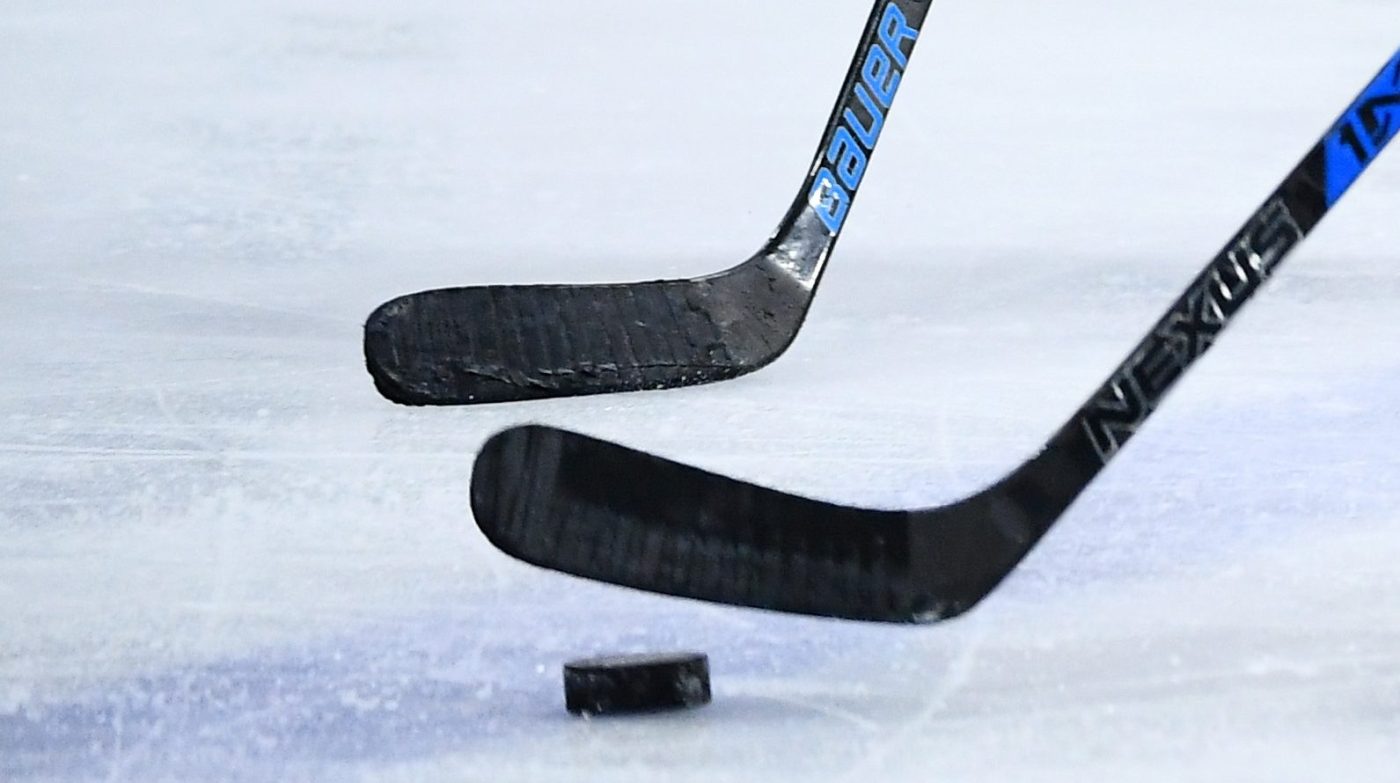
The man behind Major League Hockey has a history of not delivering
GRAND FORKS — David Waronker answered his office phone in Florida last month.
He was asked about a man he crossed paths with 20 years ago named Max Chambers.
“He in jail?” Waronker asked.
No, he’s not.
Chambers is again surfacing in the hockey world — just as he has every few years for the last two decades — as someone who claims to have big money and big plans.
Chambers has come forward several times as a prospective buyer of hockey teams — two minor league teams in Florida, the St. Louis Blues and Phoenix Coyotes of the NHL, and the Victoria Grizzlies of the British Columbia Hockey League.
His method of operation is similar. He says he has foreign money coming in. He promises a major influx of cash to the organization. His name lands in media reports.
But in the end, he doesn’t come up with the money.
Every time, Chambers eventually fades away without a sale and without proof he even has any significant financial means. He lies low for a couple of years, then pops back up again.
His latest venture into the hockey world has been his most ambitious and widespread.
Since January, Chambers has been telling people he’s the chief executive officer of Major League Hockey, a supposed big-money startup three-on-three hockey league set to launch this fall. He says there will be a single-entity owner for 16 teams across North America. Each will have local general managers, coaches and a $30 million salary cap.
The league, he says, will have more than $10 billion Canadian invested into a bank account to cover the first five years.
Chambers has been pursuing general managers and coaches with six-figure, multi-year offers. Some prospective personnel have been told the investment money is coming from Saudi Arabia. Others have been told the source is not Middle Eastern.
The big-money promises have drawn the attention of hockey personnel from across North America. Chambers has connected with people from junior hockey to the NCAA to NHL front-office personnel and even one former prominent NHL general manager.
He’s contacted players, too, some of whom have considered passing on other pro opportunities. Contact also was made with at least one active college player, who would lose his NCAA eligibility if he signed.
Much of it has remained behind the scenes, because Chambers frequently asks those requesting info from the league to sign non-disclosure agreements.
Some have declined to speak publicly because they’re hoping the league will happen, and they don’t want to upset Chambers and potentially miss out on a big pay day. Others don’t want to close doors with other opportunities if Major League Hockey falls through.
Major League Hockey has made its way into media reports.
It was first publicly revealed by hockey YouTuber Steve “Dangle” Glynn on the evening of May 9 through a video posted on Twitter/X, where he has more than 230,000 followers.
That same evening, agent Allan Walsh, who has more than 69,000 followers on X, posted: “This is going to surprise a lot of people with its popularity and ability to generate revenue. I’m hearing this venture has significant financial backing.”
But within 24 hours, Glynn announced he was deleting his video about the proposed Major League Hockey because of concerns about its legitimacy. Walsh also deleted his tweet.
That did not end the publicity, though.
Two weeks later, Manitoba-based agent Darryl Wolski first revealed the league’s website was live with a post on X, saying “Big things on the horizon.” Wolski pinned it on his X account. More than 375,000 people have seen the tweet.
Four days after that, hockey’s most prominent insider, Elliotte Friedman, discussed Major League Hockey on one of the sport’s most popular podcasts, 32 Thoughts, with Jeff Marek.
Friedman and Marek offered skepticism the league would happen, but Friedman said he was told by sources the league is being funded by an entity in Europe, not Saudi Arabia, and that a player in the final four of the Stanley Cup Playoffs inquired about joining it.
Despite all of this, when Chambers or those connected to him were asked by the Herald if they could provide any evidence he has the money, nobody has even attempted to.
There’s little public information about Chambers.
What’s known is that he’s Canadian. He’s been listed as a Calgary resident. He now appears to live near Victoria in British Columbia. But there’s nothing online about his business operations or even his line of work.
When you track down people who have dealt with Chambers in the hockey world, they offer warnings.
David Waronker is one.
A failed attempt in Florida
As the NHL appeared headed for a lengthy lockout in 2004, an idea surfaced from Ontario-based businessmen to restart the World Hockey Association, a one-time competitor of the NHL in the 1970s.
Chambers came forward as a potential owner. He planned to buy minor league hockey teams based in Orlando and Jacksonville from Waronker and move them into the WHA.
Chambers even held a press conference to announce NHL great Butch Goring would be the coach of the Orlando franchise.
But the sale never happened.
Waronker called it off after Chambers failed to pay the deposit.
“He’s always wanted to be a big-money guy,” Waronker said. “I’m talking back in 2004, 20 years ago, he would say, ‘I’ve got gas leases, minerals in Canada.’ There’s nothing. Back then, it was much harder to find anyone on the internet. He turned out to be a big (fabricator) with nothing.”
When reached by the Herald last month, Goring said he doesn’t recall ever meeting or talking to Chambers, nor does he remember Chambers’ announcement he would be the head coach in Orlando.
“I would have been coaching in Europe at the time,” Goring said, adding that he wouldn’t have considered a job like the Orlando one.
After Waronker called off the sale, Chambers disappeared from the public radar for a few years.
“He’s an elusive, strange guy that keeps poking his head out for God knows why,” Waronker said. “I don’t know who would believe him. He doesn’t have any credibility. He’s never been able to prove he’s got a dollar in his pocket.”
Waronker was told about Major League Hockey and that people were considering leaving jobs for Chambers’ newest venture.
“Absolutely don’t do it,” Waronker said. “Don’t do anything. Let him show you the money first. I’m talking real money, not hypothetical money.”
NHL franchise sales
Chambers briefly reappeared in the news in 2009 when he was listed in the Toronto Globe and Mail as an “oil tycoon” who inquired about purchasing the Phoenix Coyotes. But he was quickly dismissed by a lawyer representing the Coyotes’ owner and no formal bid was submitted.
Two years later, Chambers came forward as a potential buyer of the St. Louis Blues.
He was the subject of a story in the St. Louis Post-Dispatch, which listed Chambers as the CEO of Sonoma Equities and Great Northern Capital Partners. Chambers told the Post-Dispatch he planned to sink $8-10 million more into the Blues’ payroll and make them into a Stanley Cup contender.
But the Blues rejected his offer of $167 million without consideration and instead sold to Tom Stillman for substantially less money — about $120 million, according to Forbes.
A source close to the Blues said Chambers was known within the organization as an “international man of mystery,” and his bid became a punchline.
Months later, the Globe and Mail published a piece looking into Chambers, saying “next to no information on either of Chambers’ alleged companies can be found.”
The report also said: “Someone whose business involves checking out potential buyers of professional sports teams said he asked several people in Calgary, including some bankers, about Chambers. No one had ever heard of him.”
After that, Chambers again appeared to fade into the background for a few years.
BCHL involvement
In 2020, Chambers came forward as a potential buyer of the Victoria Grizzlies, a junior team in the British Columbia Hockey League.
He told then-owner Ron Walchuk he had a mechanism for obtaining millions from a foreign source to fund the purchase.
Chambers requested, before a sale went through, that the Grizzlies name his 17-year-old son, Auzzie Chambers, assistant general manager. It was a position the Grizzlies did not have, so they agreed. Auzzie previously had brief stints as a scout with other hockey teams in British Columbia.
The Grizzlies announced Auzzie’s hire in May 2020.
Max Chambers immediately began telling people in the organization that an influx of money was coming once he owned the team.
“Everybody was going to get big raises,” said Craig Didmon, Victoria’s head coach at the time. “The budget was going big. But pretty quick, you realize there was no money.”
Even so, the elder Chambers began to be active within the organization. He brought prospective players on visits without Didmon’s knowledge.
Didmon said Chambers’ presence began to cause rifts within the organization. After a while, Didmon asked Chambers to stay out of the arena until he bought the team.
“I didn’t believe there ever was going to be a deal,” Didmon said.
Didmon was correct. Chambers never paid.
The Grizzlies eventually moved on from Chambers as a potential owner and his son as the assistant general manager.
The fallout continued into the next year, though.
Max Chambers had communicated with prospective players about joining the Grizzlies, unbeknownst to Didmon.
“They thought they were signed to play for the Grizzlies,” Didmon said. “They were decent players, but they weren’t on my radar and I didn’t have room. I had my own team. I felt bad for them. He certainly put them in a predicament.”
Walchuk declined to publicly comment on what transpired, but he confirmed that Chambers never paid any money. Walchuk eventually sold the team to another party.
The following year, the BCHL’s Cowichan Valley Capitals hired Auzzie Chambers to be a scout and help with administrative tasks.
But within two months, the Capitals’ owner saw that Auzzie had listed himself as the assistant general manager and scouting director on Elite Prospects — titles he did not have — and immediately cut ties with him. Auzzie’s LinkedIn page still lists those titles.
“I never had any problems with him and appreciated the help,” said Brian Passmore, the Capitals’ coach at the time. “But when he started self-proclaiming titles, our owner said, ‘That’s enough.’ ”
By then, the idea for Major League Hockey had already started percolating.
Major League Hockey push
Chambers first registered a business called Major League Hockey Corp., in Alberta in 2009. He registered Major League Hockey Investment Group Inc., on June 17, 2022.
Related Articles
Florida, man! Panthers outlast Oilers to win first Stanley Cup
Wild trade prospect Adam Beckman for AHL all-star Graeme Clarke
Wild release 2024-25 preseason schedule
Minnesota youth hockey camp creates Adam Johnson Memorial Scholarship to honor the late alum
But it appears his big break into making connections came when he enlisted the help of Peter Young, a longtime, well-known broadcasting figure in Manitoba.
Chambers and Young go back more than 20 years.
Young was the director of operations for the reboot of the WHA in 2004 when Chambers said he was going to buy the Orlando and Jacksonville franchises from Waronker. They both attended the press conference prematurely announcing Goring as the coach, according to the Orlando Sentinel.
Young connected Chambers with people on both the business and hockey fronts.
In business, Young is part of Liberty Sports Group, which agreed to help Chambers with the launch of Major League Hockey.
Two members of Liberty Sports Group, CEO Nicholas Desrosiers and Twin Cities-based architect Nick Sperides, confirmed they did not sign a contract with Major League Hockey nor were they paid by Chambers to help get the league off the ground. The work was done on a volunteer basis.
Desrosiers said he connected Chambers with “his website guy” to build the website for Major League Hockey. Desrosiers declined to identify who built it but said the person was paid.
Young also helped connect Chambers to hockey personnel. One of them was Wolski, an agent for 2112 Hockey Agency. Wolski contacted some in his sphere, according to multiple sources. That, in turn, helped the proliferation of the idea across the hockey world.
To try to recruit people to join Major League Hockey, Chambers distributed a 27-page brochure.
The brochure said arena deals were in place or pending in 16 markets. It listed the markets as Vancouver; Victoria, B.C.; Fraser Valley, B.C.; Los Angeles; West Valley, Ariz.; Saskatoon; Fort Worth; San Antonio; Minneapolis; Kansas City; New England; New York City; Quebec City; Greater Toronto; Moncton, N.B.; and Nova Scotia.
But within three months, those markets were already changing, and claims that arena deals were either in place or pending turned out to be false. The Herald contacted every hockey arena in Minnesota that seats more than 5,000 people. Nobody had heard of Chambers or Major League Hockey.
Potential recruits were told about arenas in other markets, including Omaha and Saskatoon. When contacted, those arenas said they had no agreements in place.
While the promise of big money piqued the interest of many who were contacted, some had reservations about the outlandish claims in the 27-page document.
For starters, it says Major League Hockey will have $10 billion Canadian in a bank account when the league begins. It’s such a staggering figure that you could buy nearly a third of the NHL’s franchises for that money. For reference, The New York Times reported that Saudi Arabia’s sovereign wealth fund invested “more than $2 billion” to fund LIV Golf.
The Major League Hockey document said the value of each franchise is $2.5 billion. That’s more than double the Detroit Red Wings’ valuation, according to Forbes ($1.2 billion).
It said each team’s budget will be $150 million. According to a 2021 article in The Athletic, the Tampa Bay Lightning had an operating budget of around $100 million.
As the spring hit, Chambers sent an email to prospective staffers with more eyebrow-raising claims.
He said the league’s start date was being pushed back a month because of “supply chain issues.”
He also said all 16 teams would be individually listed on the New York Stock Exchange and that he was flying to Europe on May 11 to “sign off on the first round of financing totaling in excess of $2,500,000,000.”
Despite that supposed influx of astronomical capital, nobody working on behalf of Chambers and the league — outside of a webmaster — said they were paid anything.
The brochure lists just three people involved: Chambers as the CEO, his now 22-year-old son Auzzie as the senior vice president and director of player personnel, and Young as the executive vice president for strategy and league development.
Young, who is battling cancer, confirmed to the Herald both he and his group, Liberty Sports, strictly served as volunteers and were never paid by Chambers. Young declined to comment on any other specifics, citing a non-disclosure agreement he had signed.
Auzzie’s involvement is unclear. Nobody contacted by the Herald for this story said they had spoken to Auzzie.
Bizarre method of operation
The league’s communication with prospective players also has been bizarre.
Major League Hockey’s website posted it held a draft of 880 players. But it hasn’t posted any results nor has it said who was part of selecting players.
Major League Hockey has sent unsigned emails to players with scant details. They’ve instructed some to sign non-disclosure agreements to learn more about the league and negotiate deals.
Chambers has drawn up and sent written, multi-year contracts to some players and coaches.
The Herald has learned the identity of several players who have been in contact with Chambers or others within Major League Hockey. Most are American Hockey League/ECHL tweeners who have been on minor-league contracts. The money being offered by Chambers is potentially life-changing for them, so many have pursued deals.
Some players have shared details with their agents. Those from the most prominent agencies are skeptical due to the amateur nature of the operation.
While most leagues covet media coverage and attention, Major League Hockey has tried to operate from the shadows, avoiding coverage and scrutiny.
Chambers initially told people there would be a public announcement in mid-March. That turned into May, then June and now July. There still has not been a public announcement with any key details, and those involved have ducked questions.
When Young was asked via email if he has any proof that Chambers has the money he claims, Young responded that he’s been instructed by an attorney not to make any more comments.
When the Herald reached Chambers by phone Friday, he hung up immediately. Chambers did not respond to a follow-up email inquiring about his attempts to get involved in hockey.
“It’s a pattern,” Waronker said. “He’ll say, ‘I’m waiting for overseas money.’ There’s nothing there. There’s zero history except (lies). It is scummier than can be.”
Related Articles
Justin Morneau excited to see longtime friend, Twins teammate Joe Mauer honored in Cooperstown
Twins release 2025 schedule
Where do Loons stand as summer transfer window opens?
Gophers basketball: Star Dawson Garcia suffers foot injury, but expected back for season
Loons collapse with two goals allowed after 90th minute in 3-2 loss to D.C.


